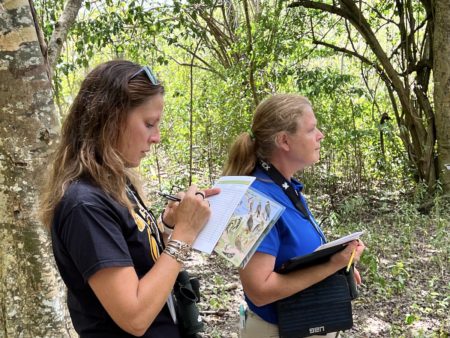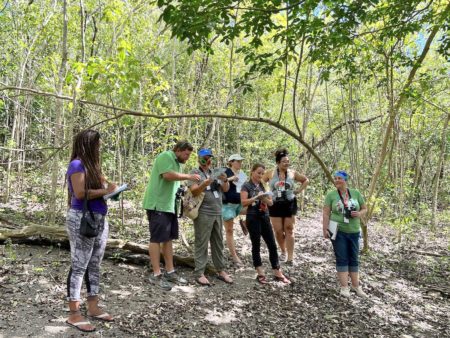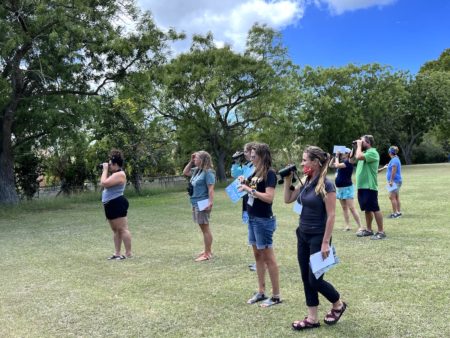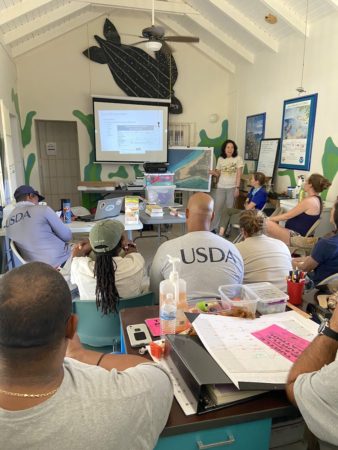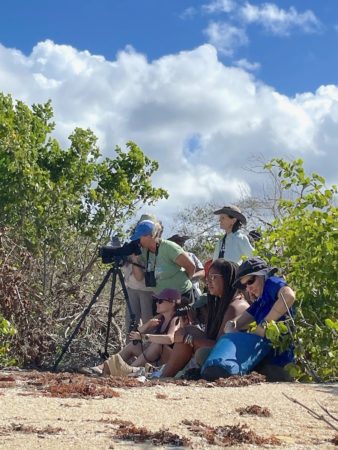Jen Valiulis, Executive Director, St. Croix Environmental Association (SEA) shares her recent experience hosting a BirdSleuth Caribbean Workshop in St Croix, US Virgin Islands, April 5 & 6, 2022. Follow along for a vicarious experience of the workshop, and see what the educators discovered and how they are putting what they learned to use!
Through workshops at BirdsCaribbean conferences, I had learned some BirdSleuth activities already and several of them have become staples in my Environmental Education Toolkit. Bird Bingo and the Habitat Scavenger Hunt are always favorites! I was excited to go through the full training, and even better, to be able to offer it to other educators on the island. As we transition back to in-person learning, but still have to deal with periodic COVID outbreaks, having so many activities that can be done outdoors is especially valuable to teachers. A dozen educators spent two days exploring the BirdSleuth Caribbean curriculum and re-envisioning their island as a birding hotspot.
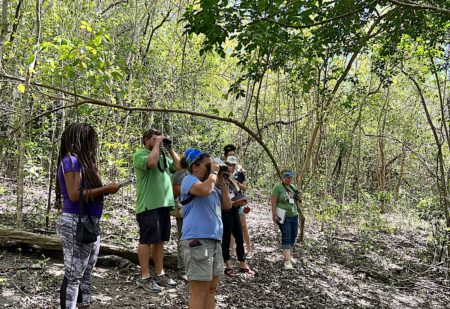
Day One: Back to School!
Training aptly began on the 34-acre campus of the Good Hope Country Day School in Kingshill – a pleasant and spacious setting for some birding. We started with some Birding 101. We learned how to use binoculars and how to become more comfortable and confident as birders. Some participants soon realized that they knew more about birds than they thought; they were able to identify a surprising number of common species.
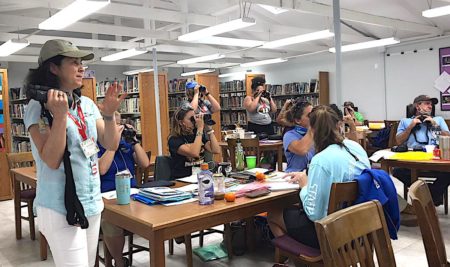
Participants were introduced to bird basics and fantastic tools that could be used to identify and collect data on birds, such as eBird and Merlin. These are critical tools in the hands of “citizen scientists” and for crowd-sourced research. Whether you are an individual, in a classroom, or a community member, this can have impact well beyond a single activity or learning. The BirdSleuth Caribbean curriculum was unveiled as the training team used it directly with participants in lessons such as “What makes a bird a bird?” Teaching teams tried out the lesson plans and hands-on activities themselves – and had a great deal of fun becoming “students” for a while!
In the afternoon, participants went outside and practiced using their binoculars and identifying birds with the Bird Detective game – laminated birds hidden in the forest! “Sound Map” and “Tall to Tiny,” showed teachers how they could help students build their observation skills by being quiet and focusing on the sites and sounds around them.
Finally, using senses other than the sense of sight, participants tried to identify the birds in their surroundings. This activity revealed several warblers singing in the canopy. The group also experienced the unique challenge and excitement of identifying warblers that just wouldn’t sit still! Our patience and teamwork paid off, however, and we identified them as a Northern Parula (uncommon on St. Croix) and an American Redstart. It was a satisfying end to the day!
Day Two: BirdSleuth Trainees At Large
On the second day we ventured out in the field, starting bright and early with a visit to the Sandy Point National Wildlife Refuge. We all worked to hone our birding skills at the newly constructed bird blind (a structure that lets you watch birds without being seen) along the shores of the largest salt pond in the territory. Peering through the slots with binoculars raised, we identified a large flock of Black-bellied Plovers, Royal Terns, and Black-necked Stilts – a crowd favorite. Black-whiskered Vireos singing their monotonous song “sweet-john-chewit, sweet-john,” and Yellow Warblers singing “sweet-sweet-sweet-sweeter-than-sweet” were also identified and viewed. We then moved on to check out the avifauna on the beach, and test out some of the BirdSleuth activities, including Bird Bingo.
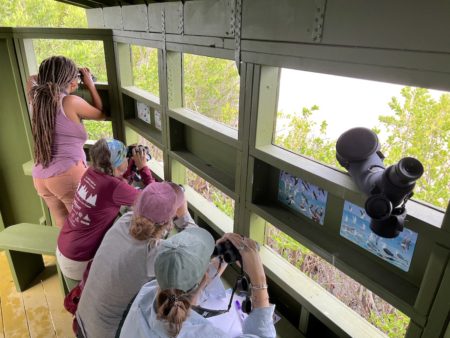
Our next stop was the St. George Village Botanical Garden. This was a dramatic change of scenery and an opportunity to not only enjoy the resident birds but also many unusual and important plants that provide habitat for biodiversity. The Green-throated Carib and Antillean Crested Hummingbirds were the highlight at this stop.
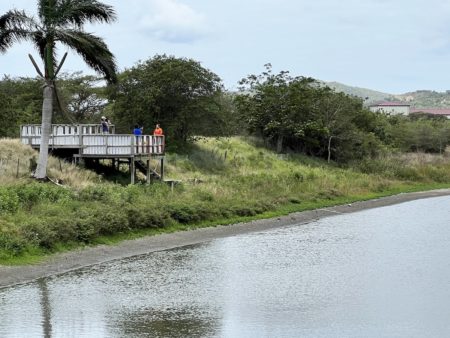
Our field day ended at Buddhoe Farms, an organic farm and the site of one of the largest freshwater ponds on the island—Fredensborg Pond, an ideal spot to test out all that we had learned over the last two days. We put our birding skills to work and identified the diversity of birds at the pond. This included Blue-winged Teal, White-cheeked Pintails, Pied-bill Grebes, Scaly-naped Pigeons, White-winged Doves, Common Gallinule, Snowy Egret, Great Egret, Cattle Egret, Red-tailed Hawk, Gray Kingbird, Barn Swallow and Bananaquits. Working together to register our sightings on the all-important eBird list, we fledgling citizen scientists capped it off with a round of the Bird Migration game, where birds (us humans!) tried to navigate the many challenging “obstacles” to arrive safely at their breeding grounds. It was great fun and a good cardio workout too!
Participants engage in the “Migration Obstacle Course” where they gain a deeper understanding of the daily challenges birds face during migration – such as collisions with glass buildings and the dangers of power lines, hunters, and hurricanes.
Bonus Day! Caribbean Waterbird Census Training
It was “BirdSleuth Plus”!
On the day following the BirdSleuth workshop, BirdsCaribbean Executive Director, Dr. Lisa Sorenson, led a one-day training on the Caribbean Waterbird Census (CWC). Practitioners from many agencies and organizations from all three of the major islands in the Virgin Islands improved their birding competencies through field observations and focused presentations on some of the more challenging species (those confusing sandpipers, for example!).
This rare opportunity to bring together so many conservation professionals to focus specifically on birds sparked important conversations about conservation practices and concerns. We wanted to keep the conversation going, and maintain our excitement about birds after the workshop, so we created a Whatsapp Birders group! Here, we share our observations, identification questions, and anything else bird-related across the territory. So far, it has been exciting to share and comment on what everyone is seeing. The highlight for me, thus far, has been the observations of the pelagic birds that some members of our group see when they go fishing.
The importance of the CWC was emphasized by challenges we had in finding wetland sites for our workshop. A multi-year severe drought coupled with hurricane damage to wetland sites have meant that some of the local hotspots have been so altered that birds are few and far between. For example, Great Pond, formerly the best site for waterbirds on the island, and home of Hope” the Whimbrel for many years, has dried up due to drought and other issues and most of the mangroves are, sadly, now dead. CWC surveys have documented the decline in diversity and overall numbers at these sites and this data will be used to inform upcoming wetland restoration projects.
We need to reclaim our wetlands, for the birds!
BirdSleuth Springs Into Action!
BirdSleuth is not about sitting still. Since the workshop in April, we hit the ground running by engaging well over a hundred students in BirdSleuth activities. Students at the Claude O. Markoe school in Frederiksted were especially excited when they found an active nest in a tree on campus and promised to watch it for any developments. A sixth-grade teacher who attended the BirdSleuth training was inspired. She has used the activities to nurture a new-found enthusiasm for birds amongst her students, getting her class involved in creating a guide to the common birds on the school campus.
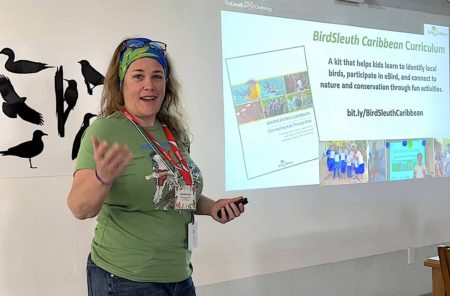
Many other educators have approached us about offering further training, so we are working to make that happen! We are on a BirdSleuth mission!
In the meantime, the BirdSleuth Caribbean curriculum and supporting materials are available for free download in English, Spanish and French. Click here to download.
Acknowledgements: This workshop was funded by a grant from the VI Department of Planning and Natural Resources to Horsley Witten Group. Many thanks to the Company House Hotel for providing discounted accommodations, the Good Hope Country Day School for providing the venue for the BirdSleuth training, the Sandy Point National Wildlife Refuge for providing the venue for the CWC training, Buddhoe Farms for welcoming us to their property for birding, Brian Daley for logistical support, Workshop facilitators, Lisa Sorenson (BirdsCaribbean) and Jennifer Fee (Cornell Lab of Ornithology), and Lisa Yntema for assisting with the CWC training.
Testimonials
Participants shared their thoughts on the training and how the practical knowledge shared can be implemented in their respective classrooms.
Olivia Walton, Education Coordinator, St. Croix Environmental Association (SEA)
“I really enjoyed the BirdSleuth training. It gave me a chance to connect with a lot of local like-minded experts and opened up opportunities for collaboration. The flow of the activities and the type of activities created a great sense of bonding between all of the educators and this made it easier to form those connections. I really think that we will stay connected after this, which really has been a great opportunity.”
Maranda Wood, Secondary Science Teacher, Good Hope Country Day School, US Virgin Islands
“I really enjoyed the BirdSleuth activities because my school has 3 year olds all the way to 12th grade students, so my mind is going crazy with the number of things I can incorporate and share with my fellow teachers. The kids are going to love it! This training has been so wonderful and I can’t wait to share the plethora of knowledge that I learned.”
Ky Reale-Munroe, Environmental Scientist
“I attended the BirdSleuth training to learn more about birds and it was awesome, especially the hands-on activities. This training was definitely memorable and very useful, thank you!”
Jane Coles, Middle-school Science Teacher, Good Hope Country Day School, US Virgin Islands
“I am going to use the BirdSleuth Curriculum with my middle school students and I’m going to help them to carry the program to the other students on our campus.”
Jahnyah Brooks, Department of Planning and Natural Resources, Division of Fish and Wildlife
“Following this workshop, I feel very empowered to go out and identify birds. I understand the steps it takes and the scientific way of going out and doing it. I work with arthropods and I went through a similar process – from the microscope to the field and seeing the different species. It really does all come together. I think this workshop does empower local scientists like myself and everyday citizens who may not be as comfortable in the wild. It gives us a really strong foundation to actually go out and identify these birds.”
Haley Jackson, St. Croix Sea Turtle Project
“This workshop was very informative. The different activities are applicable not only to birding, but can also be updated and used for many other species and habitats. I thought the training was really awesome. We learned a lot of really great tools and ideas on how best to get kids engaged with the environment.”
Gallery
Enjoy more photos from the BirdSleuth training below. Click the images to enlarge and see their captions.

